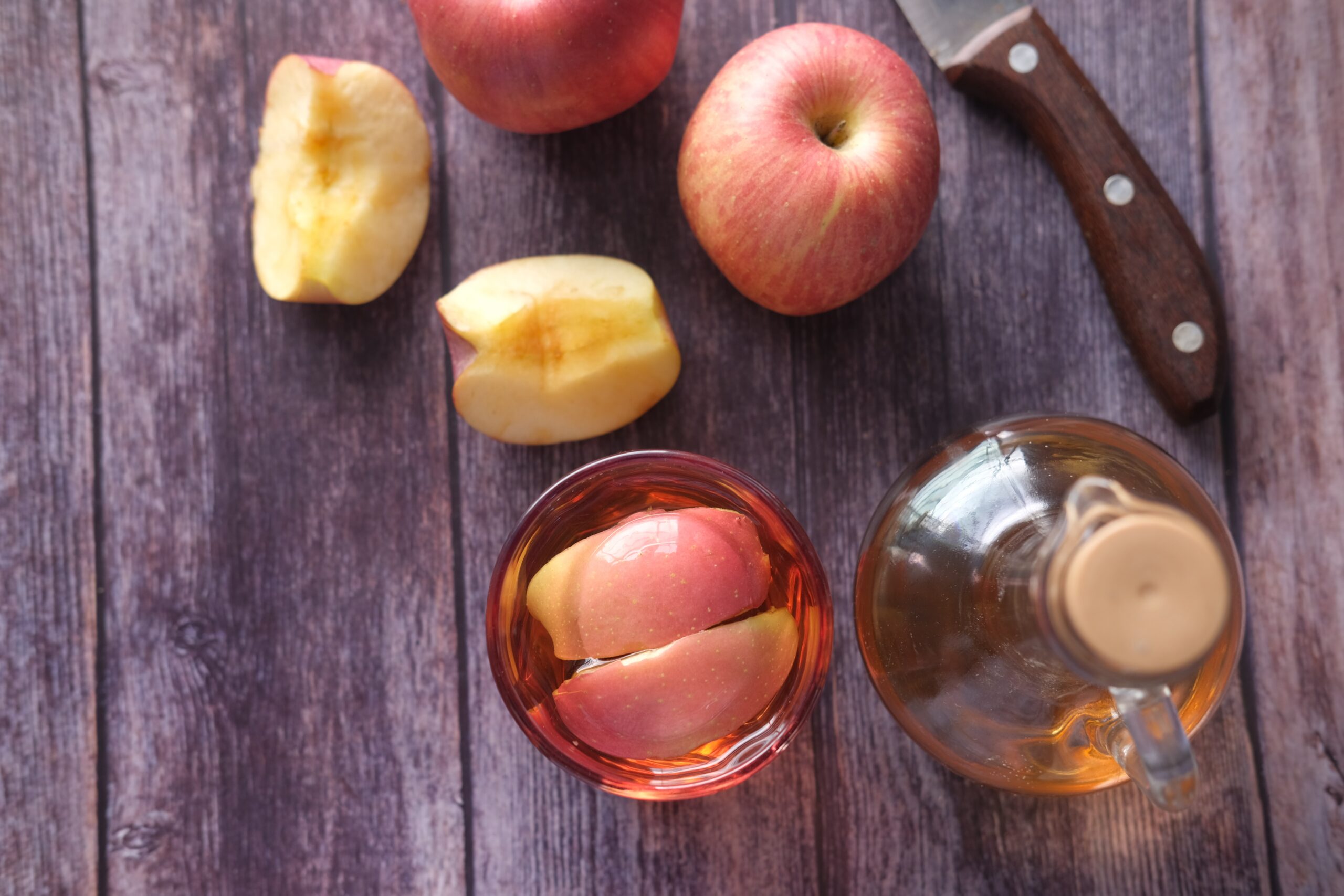Organic Apple cider vinegar uses fermented apple juice as the main ingredient. The process of manufacturing apple cider vinegar begins with picking fresh apples and crushing them to obtain the juice. The juice is then fermented with the addition of yeast and good bacteria. The sugar content in the juice gets converted first into alcohol and then into vinegar through fermentation.
Apple cider vinegar enjoys massive popularity worldwide and has been around for centuries. Throughout history, people of many different cultures have shown various apple cider vinegar uses. It is a natural remedy for many health issues like high blood sugar, heart health, and skin and hair ailments.
Many apples cider vinegar uses and benefits can be attributed to the fermentation process. It has many healthful properties, including but not limited to antimicrobial and antioxidant applications.
Apple cider vinegar uses are many, as it is a household and kitchen staple. You can use it for cooking, cleaning, preserving food, and as a home remedy for some illnesses. It improves skin and hair health, aids weight loss, and improves metabolism and gut health.
Healthy products such as fruit vinegar are readily available nowadays, and you can buy apple cider vinegar online from the comfort of your home. Apple cider vinegar price can vary depending on the quantity and brand, so you can choose one that suits your needs. Most brands are suitable for all apple cider vinegar uses.
Apple cider vinegar uses
1. Weight loss
Research shows that apple cider vinegar could help people lose weight by increasing feelings of fullness. When you feel fuller, it leads to eating fewer calories and losing weight. According to studies, taking apple cider vinegar and a high-carb meal helps you eat fewer calories throughout the rest of the day. Daily apple cider vinegar consumption leads to reduced belly fat and weight loss. Remember that simply adding or subtracting single foods or ingredients rarely has a noticeable effect on weight. Long-term weight loss is created by adopting a helpful and supportive diet and lifestyle habits.
Apple cider vinegar may also contribute to weight loss by lowering blood sugar and reducing insulin levels as it only contains about three calories per tablespoon, which is very low. Apple cider vinegar lowers body mass index, reduces belly fat, and helps curb appetite.
2. Cleaning
Vinegar has been popularly used to disinfect and clean surfaces throughout history since it can kill pathogens like bacteria. It has also historically been used as a food preservative in many cultures. Research has shown apple cider vinegar inhibits bacteria like E. coli and Staphylococcus, and it may also be an antiseptic. Popular apple cider vinegar uses include preserving food and cleaning fresh produce, as it stops the growth of various bacteria and prevents spoilage. It is effective against microorganisms that grow on food like salmonella, but it is necessary to wash your produce well before use since it does not combat all microorganisms. Additionally, it is recommended not to use apple cider vinegar to disinfect any wound because it can burn the skin due to its acid content.
Read more: #HPV Search Kiya Kya?
3. Skincare and hair care
Skin and hair care are popular apple cider vinegar uses. Thanks to its antibacterial properties, it is a common remedy for skin conditions like dry skin and eczema. Since the skin is naturally slightly acidic, topical apple cider vinegar could also help rebalance the skin’s natural pH, improving the protective skin barrier.
Some people use diluted apple cider vinegar in a face wash or toner to kill bacteria and prevent spots. However, some studies show that apple cider vinegar soaks do not improve the skin barrier and cause skin irritation in people with eczema, so it is always better to be careful.
Some people also use apple cider vinegar as a skin toner or acne treatment but remember to avoid applying undiluted vinegar to the skin because it can cause burns.
Many people use apple cider vinegar as a hair rinse, too, to help improve shine and smoothness as the acidic nature of vinegar may lend itself to hair use. Alkaline hair products may cause hair to become damaged and frizzy, so applying apple cider vinegar, with its acidic properties, may improve the condition or appearance of hair.
Since apple cider vinegar has antimicrobial properties, it is excellent for keeping the scalp clean and preventing infections and buildup. You may use Apple cider vinegar to treat dandruff and provide relief from flakiness and itching.
Must Read: Is Collagen Good for Your Skin?
4. Cooking
Perhaps its culinary application is the most common out of all the apple cider vinegar uses. You can substitute apple cider vinegar in any recipe that calls for vinegar. Due to the use of apples in making it, apple cider vinegar has a subtly sweet flavour that balances out the acidic tartness inherent in any type of vinegar. You might think it is only suitable for salad dressings and vinaigrettes, but apple cider vinegar can add a kick of flavour to everything from soups to marinades for meat, poultry, and seafood. You can add it to smoothies, curries, condiments, stir-fries, rice dishes, and even pasta sauces.
Another one of the apple cider vinegar uses in the kitchen is for poaching eggs. You can add a little vinegar to your water before cracking the eggs to poach. The acid in apple cider vinegar helps the protein in the eggs firm up much faster, which is what you want when poaching eggs. This process enables you to get consistently good eggs that hold their shape and cook perfectly and quickly.
5. Food preservation
Using vinegar for preserving food has a long history in many cultures. The Egyptians and the Indians used to preserve food with vinegar in large urns. The necessity of it probably arose from having to travel long distances or storing seasonal food. Like any other type of vinegar, apple cider vinegar can be used as an effective preservative. The acid in vinegar kills enzymes and bacteria that may cause food to spoil and halts microorganism activity. This property keeps the food edible for a long time. The most popular apple cider vinegar uses for food preservation are probably pickling and canning. It is as simple as creating a pickle base liquid using apple cider vinegar, salt, and any spices for flavour. Once the base is ready, you can add a wide variety of vegetables and fruit and seal it in a jar with a water seal or can it. Food preserved with vinegar will keep for a long time.
Precautions
Pure vinegar is acidic and abrasive. You should avoid consuming undiluted vinegar as it can harm tooth enamel. If the tooth enamel wears down, it does not heal and leads to sensitive teeth prone to cavities, decay, and pain. Additionally, directly consuming undiluted apple cider vinegar can irritate and damage the throat.
One of the apple cider vinegar uses is that it is beneficial for the skin. However, direct application of undiluted vinegar can irritate and burn the skin over time. It can cause severe damage that requires medical attention. Similarly, apple cider vinegar can also irritate and burn the scalp and eyes. Always be careful while applying it to the face or hair. You should never use Apple cider vinegar to treat open wounds.
You can buy apple cider vinegar online or in stores but check the labels for no additives and added sugars. One of the apple cider vinegar uses is as a preservative, so it does not need added preservatives. Apple cider vinegar with the “mother” has a reputation for being the best. Check your apple cider vinegar price, as organic products tend to be pricey, but a good quality vinegar shouldn’t cost you an excessive amount.
Recommendation
With so many apple cider vinegar uses, you might be interested in purchasing it yourself either online or from stores. Some are made with organic golden apples that are sourced from Himachal Pradesh. These apples are rich in fibre and have a low sugar content making them tasty and healthy. The golden apples also make the best apple cider vinegar for weight loss.
Must Read: Here are the top 10 Unhealthy Foods to Avoid





